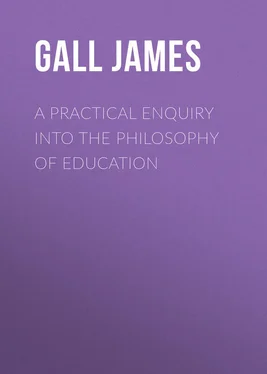James Gall - A Practical Enquiry into the Philosophy of Education
Здесь есть возможность читать онлайн «James Gall - A Practical Enquiry into the Philosophy of Education» — ознакомительный отрывок электронной книги совершенно бесплатно, а после прочтения отрывка купить полную версию. В некоторых случаях можно слушать аудио, скачать через торрент в формате fb2 и присутствует краткое содержание. Жанр: foreign_detective, foreign_antique, foreign_prose, на английском языке. Описание произведения, (предисловие) а так же отзывы посетителей доступны на портале библиотеки ЛибКат.
- Название:A Practical Enquiry into the Philosophy of Education
- Автор:
- Жанр:
- Год:неизвестен
- ISBN:нет данных
- Рейтинг книги:3 / 5. Голосов: 1
-
Избранное:Добавить в избранное
- Отзывы:
-
Ваша оценка:
- 60
- 1
- 2
- 3
- 4
- 5
A Practical Enquiry into the Philosophy of Education: краткое содержание, описание и аннотация
Предлагаем к чтению аннотацию, описание, краткое содержание или предисловие (зависит от того, что написал сам автор книги «A Practical Enquiry into the Philosophy of Education»). Если вы не нашли необходимую информацию о книге — напишите в комментариях, мы постараемся отыскать её.
A Practical Enquiry into the Philosophy of Education — читать онлайн ознакомительный отрывок
Ниже представлен текст книги, разбитый по страницам. Система сохранения места последней прочитанной страницы, позволяет с удобством читать онлайн бесплатно книгу «A Practical Enquiry into the Philosophy of Education», без необходимости каждый раз заново искать на чём Вы остановились. Поставьте закладку, и сможете в любой момент перейти на страницу, на которой закончили чтение.
Интервал:
Закладка:
It is here of importance to recollect, that almost all the information received by children, is of a sensible kind. They can form little or no idea of abstract truths. The mind and the memory must be stored with sensible objects, – first individually, and then by grouping, – before the child can arrive at a capacity for abstraction. Nature's first object, therefore, is to store the memory and imagination of the young with the names and images of things, which, as we have seen, are acquired individually, and, when once known, are remembered for future use. But those things which they have not yet seen, or felt, or heard, or tasted, are totally beyond their conception, and cannot be of any service, either in grouping, or classification. – Hence the great importance of allowing the young mind to act freely in acquiring new ideas by this principle of individuation; as without this, all the lessons into which such ideas shall afterward be introduced, must be in a great measure lost. Even adults can form no idea of an unknown object, except by compounding it of something that they already know. And this is at least equally the case with children; who, till they can group and compare objects which they have seen, can realize no idea of any thing, however simple, that has not previously been subjected to the senses. – Hence, therefore, the importance at this period of a child's education, of confining the attention chiefly to sensible objects, and of not confounding his faculties, by too early an introduction of abstract ideas.
Here then we have been able to detect the method by which Nature selects, and enables her pupils to prepare the materials of which their future knowledge is to be compounded. These materials are the ideas of sensible objects, and their properties and uses; which must be gathered and stored one by one. By inducing them to attempt to seize even two at a time, they will most probably lose both, and their powers of collecting and storing will, by the same attempt, be injured and weakened. It is by means of this principle of individuation, that, with the most intense craving for information, and while placed among innumerable objects calculated to gratify it, the infant and the child remain perfectly collected, without the slightest appearance of distraction of mind, or confusion of ideas. With his thirst of knowledge ardent and constant, it enables him with the greatest delight to add hourly to his stores of knowledge, without difficulty, without irritation, and without fatigue.
The application of these truths to the business of education, we shall attend to in its proper place; in the meantime we may remark, of how much importance it is, that all knowledge communicated to the young be simple, and that for some time it consist chiefly of sensible objects, and their qualities; – objects which they either know, or can have access to. Abstract subjects are not suited for children, till they can group, and classify, and compare the sensible objects with which they are already acquainted. The aim of the teacher, therefore, ought to be, strictly to follow Nature in this early stage of her operations, and to furnish food for his pupils, of the proper kind, and in proper proportions; – keeping the thinking powers constantly in healthful exercise, by giving as many ideas as the mind can reiterate without fatigue; but carefully avoiding all hurry or force, seeing that the powers of the mind are greatly weakened and injured by a multiplicity of objects, particularly when they are presented so rapidly, that the thoughts have not time to settle upon them, nor the mind to reiterate the ideas which they suggest.
CHAP. VI
On the Application of Knowledge by the Principle of Association, or Grouping
Another principle which exhibits itself in the acquisition of knowledge by Nature's pupils, is that of "grouping," or associating objects together, after they are individually known. A child, or even an infant, who is frightened, or alarmed, or who suffers any severe injury, remembers the several circumstances, and has the place, the persons, and the things connected with the event, all associated together, and grouped into one scene or picture on the memory. These objects may have been numerous; but by the operation of this principle, they have all been apprehended, and united so powerfully with each other, that no future effort of the child can either separate or obliterate any portion of them; and so comprehensive, that the recollection of any one of the circumstances instantly recalls all the others.
These groupings in the mind of a child, formed chiefly by means of the imagination, are almost wholly compounded of sensible objects; and the only necessary prerequisite for their formation appears to be a knowledge of the individual elements of which they are to be composed. If an unknown object be presented to the mind in connection with the others that are known, it is generally excluded, and the things previously known retained. For example, in the case supposed above, of an accident occurring to a child, there would be thousands of objects present, and all cognisable by the senses; but not one of all these that were unknown, that is, that had not previously undergone the process of individuation, is found to form part of the remembered group.
There is another circumstance connected with the operation of this principle in the young, which is of importance. Almost the whole of a child's knowledge is composed of these groupings. Before the developement of the reasoning powers, by which the individual is enabled to classify the elements of his knowledge, there is no way of remembering these elements in connection with each other, except by this principle. If, therefore, we change the order or relative position of the elements or objects which compose the scene, or group, we draw the attention of the pupil altogether from the former, and create another which is entirely new; – in the same way as the transposition of the figures in any sum, forms another of an entirely different amount. The drawing-room, for example, is seen by the children of the family with the fire-place, the cabinet, the sofas, the tables, and other stationary ornaments, in certain relative positions, and this grouping of those objects is to them in reality all that they know of the room. Any material change in shifting these objects to other places in the apartment, would, to the parent , whose judgment is ripened, produce feelings comparatively slight; but, to the younger branches of the family who group, but cannot as yet classify, it would appear like the complete annihilation of the former apartment. The different arrangement of a few of the articles only, would to them create another, and an entirely different room.
This leads us to observe another circumstance connected with the operation of this principle, in the instruction of the young, which is the remarkable fact, that, by making the child familiar with a very few primitive elements, a parent or teacher may communicate an almost infinite variety of groupings, or stories, for cultivating the mind, and increasing the knowledge of his pupil. Hence it is, that hundreds of agreeable and useful little histories have been composed for children, with no other machinery than a mamma and her child, and the occasional introduction of a doll or a dog, a cat or a canary bird. To the child, there is in these numerous groupings no appearance of sameness, nor want of variety; and although so much circumscribed in their original elements, they never fail to amuse and delight.
The most important circumstance, however, connected with the working of this principle in the education of the young, appears to be the necessity of a previous familiarity with the individual objects, before the child is called upon to group them. If this has been attended to, the grouping of these into any combination will be easy and pleasant; – but if his attention be called from the group, to examine exclusively even but one of its elements, the operation is checked, the mind becomes confused, its powers are weakened, and the grouping has again to commence under serious disadvantages.
Читать дальшеИнтервал:
Закладка:
Похожие книги на «A Practical Enquiry into the Philosophy of Education»
Представляем Вашему вниманию похожие книги на «A Practical Enquiry into the Philosophy of Education» списком для выбора. Мы отобрали схожую по названию и смыслу литературу в надежде предоставить читателям больше вариантов отыскать новые, интересные, ещё непрочитанные произведения.
Обсуждение, отзывы о книге «A Practical Enquiry into the Philosophy of Education» и просто собственные мнения читателей. Оставьте ваши комментарии, напишите, что Вы думаете о произведении, его смысле или главных героях. Укажите что конкретно понравилось, а что нет, и почему Вы так считаете.










